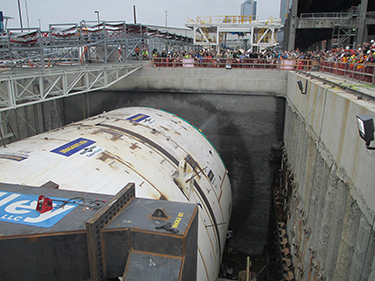|
Subscribe / Renew |
|
|
Contact Us |
|
| ► Subscribe to our Free Weekly Newsletter | |
| home | Welcome, sign in or click here to subscribe. | login |
Environment
| |
 |
September 26, 2013
Surveys 2013: Hart Crowser
Specialty: Environmental and geotechnical engineering, natural resources
Management: Michael Bailey, chief executive officer; David Winter, vice president; Mike Ehlebracht, environmental services manager
Founded: 1974
Headquarters: Seattle
2013 revenues: $20.5 million
Projected 2014 revenues: $22 million
Current projects: Upland and in-water remediation and habitat restoration of the former Custom Plywood site in Anacortes; natural resources support for design of several habitat features that will be part of the Elliott Bay seawall replacement
Hart Crowser is the geotechnical engineer of record for the $2 billion tunnel that will replace the Alaskan Way Viaduct in Seattle. It is the world’s largest diameter soft ground bored tunnel, and is expected to be done in 2015.
(Editor's note: The project value has been corrected.)
CEO Michael Bailey answered questions about the industry and his firm.
Q: What has changed in your industry and at your firm as a result of the recession?
A: As an employee-owned firm, the recession provided a unique opportunity for Hart Crowser to renew our internal commitment to our employees and to focus on improved client service to offset changes in the marketplace.
As with many firms, we saw a relative decline in the kinds of geotechnical and environmental projects driven by commercial property development. But this happened at the same time that there were new environmental opportunities for government and industrial clients, and growth of geotechnical opportunities in the transportation sector.
Hart Crowser’s revenue growth has been maintained by improved business development planning and targeting key clients and signature projects.
Q: Where will growth come from in the next few years? What markets are you entering or exiting?
A: We have seen an increasing market for permit support for resource development projects, environmental remediation for government or quasi-government clients, and industrial stormwater compliance. Natural resource permit support is a hot area due to the increased need to protect our environment while enabling industrial growth. The need for geotechnical services is increasing for vertical construction projects as well as for port facilities. Transportation design-build continues to be a strong sector, involving more medium-size projects instead of just a few mega-projects.
We also see growth in services related to water resources: water rights, habitat enhancement, beneficial reuse, and mitigating the impacts of development on watersheds. We have seen growth in our services related to mining and energy/oil and gas, and expect that to continue.
Q: What are the biggest trends and issues in your industry locally?
A: Although government funding remains tight, new contracting opportunities are available at the local and federal level that will allow growth in the environmental sector. There is also some growth in the commercial sector for engineering services. However, the difficulty of finding highly trained and experienced technical staff is a continuing concern. Support for STEM (science, technology, engineering and mathematics) education is essential for our industry.
Q: Which services are most in demand?
A: There are at least three hot areas: natural resources permitting, especially involving impacts to fisheries and aquatic ecosystems; specialized seismic design; and environmental engineering to design, build and oversee contaminated site cleanup. Many of the services in demand are driving company expansion geographically and to new but related markets and clients in our traditional service areas.
Q: Name a local environmental policy change you would like to see.
A: Politicians, the press and the public all need to embrace more thoughtful analysis of complex environmental issues. Locally and nationally there are no easy answers to producing the fuel and raw materials our society needs. Discussions about fracking to produce natural gas have to involve protecting groundwater but can’t lose sight of the goal of reducing our reliance on coal. Refusing coal train access to ports in Washington and Oregon may not keep them out of the Northwest — they may simply traverse our state on their way to British Columbia. And we cannot simply ban all new mines like the Pebble Mine (a proposed copper and gold mine in Alaska), but new mines can be designed to protect aquatic resources.
Our environmental policies need to lead the world in developing cleaner and more efficient industries, not simply in saying no to new developments in our backyard.
On a separate note, the lack of a state transportation package and the ongoing challenge of legislators to work together is troubling.
Other Stories:
- Wastewater plant cleaned up for the 21st century
- What’s next in green building? Seattle has it
- Surveys 2013: Plauche & Carr LLP
- Surveys 2013: Optimum Energy
- Surveys 2013: GeoEngineers
- Surveys 2013: Cascadia Consulting Group
- Surveys 2013: Innovex Environmental Management
- Surveys 2013: Shannon & Wilson
- Lower your energy bill by 75% with a Passive House
- Dairies struggle to balance business and the environment
- Murky floodplain rules sink development plans
- Is your data center as green as it can be?
- Protecting Puget Sound’s marine shorelines
- At the UW, smart grids put a lid on energy use
- Rising sea level threatens Port Gamble tribe
- Surveys 2013: Ridolfi Inc.



